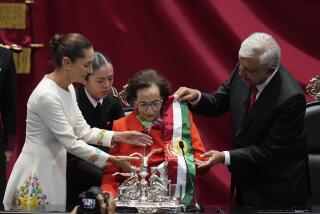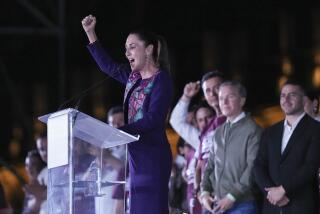New president takes office in Argentina
- Share via
BUENOS AIRES — Invoking the spirit of Eva Peron and the mothers who confronted the former dictatorship, Cristina Fernandez de Kirchner was sworn in here Monday as Argentina’s first elected female president.
“I know that it will be more difficult for me because I am a woman,” the longtime senator and former first lady told assembled lawmakers in the ornate congressional palace downtown. “But I believe I have the strength to be able to do it.”
Seated by her side was her husband, outgoing President Nestor Kirchner, who renounced almost certain reelection this year and instead designated his wife as their party’s candidate to succeed him.
Lawmakers broke into applause as Kirchner pinned the blue-and-white presidential sash on his spouse and hugged her.
Fernandez handily defeated a split opposition with 45% of the vote in the Oct. 28 balloting, running on the theme of continuing her husband’s successful efforts to revive South America’s second-largest economy.
The Kirchner era has brought four years of brisk economic growth to a nation that suffered a Great Depression-style economic and social breakdown in 2001 and 2002. But Fernandez, a center-leftist like her husband, faces sundry challenges, including rising inflation, corruption scandals and a possible energy crisis.
“I know that many things are lacking, and we will have to make corrections,” said Fernandez, 54.
Argentina’s ultimate power couple calculated that the theme championed by Bill Clinton in the United States -- “It’s the economy, stupid” -- would sway voters in Argentina, despite the Kirchners’ relative unpopularity in the capital.
The pair have inevitably been compared to the Clintons, and the four politicians have much in common, including having each met their mates in law school. Both couples launched political careers in national backwaters -- the Clintons in Arkansas, the Kirchners in chilly southern Patagonia, whose penguin has become their symbol.
The prospect of a his-and-hers shared Argentine presidency has fanned much speculation and not a few snickers here and elsewhere. The outgoing president’s role in the new administration remains nebulous. Kirchner and Fernandez have two grown children.
But the nation’s first lady turned chief executive made it clear Monday that she was in charge of her four-year term.
Fernandez delivered a subdued, 50-minute speech with a mostly solemn expression. Known as a dynamic lawmaker, she served as her husband’s informal chief policy advisor, one of the few who dared to challenge him and risk his substantial temper.
Fernandez appeared to fight back tears at several points, notably when paying homage to the late Eva Peron, the iconic former first lady still idolized by many working-class Argentines, and praising the Mothers of the Plaza de Mayo, the group known for its human rights advocacy and trademark white handkerchiefs.
The mothers’ protests about their “disappeared” children and grandchildren helped turn the popular tide against a brutal military dictatorship that gave way to civilian rule in 1983. Several of the women were on hand for the inauguration.
Fernandez and Kirchner came of age during Latin America’s turbulent 1970s and have made bringing former military and police abusers to justice a matter of principle.
“We are members of a generation that believed in ideals and convictions,” Fernandez said. “Before, we wanted to change the world. Now we’re settling for changing our nation.”
Present at the ceremony were leaders from Latin America, including Venezuelan President Hugo Chavez, who has helped bankroll the Argentine recovery with billions in petrodollars.
U.S. officials are hopeful of better relations with Fernandez than with Kirchner, whom the Bush administration viewed as hostile. But the new president, like her husband, has lavished praise on Chavez, Washington’s main adversary in the region.
Argentina’s previous female president, Isabel Peron, was not elected. She was vice president when she took office in 1974 upon the death of her husband, strongman Juan Domingo Peron. Isabel was his third wife; Eva, who died in 1952, was his second. Isabel was overthrown by a coup in 1976 and now lives in exile in Spain.
More to Read
Sign up for Essential California
The most important California stories and recommendations in your inbox every morning.
You may occasionally receive promotional content from the Los Angeles Times.










